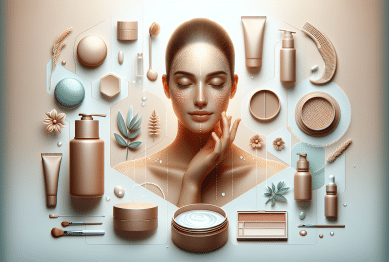Curious how changing up your skincare routine might lead to healthier, more radiant skin? Explore how ingredient choices, daily habits, and expert recommendations could reveal the path to a refreshed, natural glow—without overpromising, only offering researched guidance within the world of wellness and beauty.
Understanding the Science Behind Glowing Skin
Glowing skin isn’t magic—there’s actual science that supports why some routines foster a visibly radiant complexion. Healthy skin primarily hinges on hydration, cell renewal, and barrier repair. Dermatologists often highlight how environmental influences, nutrition, and consistent skincare practices, including moisturizers and gentle cleansers, contribute to a naturally luminous look over time. These routines support the skin’s microbiome—its natural layer of protective, beneficial bacteria. When balanced, this barrier can better resist irritation, dryness, and damage. Ingredients such as hyaluronic acid, ceramides, and niacinamide are especially prized for their evidence-based role in supporting the skin barrier and maintaining hydration levels, factors closely tied to a natural glow (Source: https://www.aad.org/public/everyday-care/skin-care-basics/care/skin-care-routine-basics).
The consistent application of a skincare routine helps reinforce both short- and long-term skin health. Regular cleansing removes environmental debris and excess oil, while gentle exfoliation supports the natural process of shedding dull skin cells. This reveals fresher, more luminous skin below. According to dermatological research, even subtle changes—like using lukewarm water or patting a moisturizer onto damp skin—play a role in promoting radiance for all skin types (Source: https://www.ncbi.nlm.nih.gov/pmc/articles/PMC5843357/).
Sun protection forms the foundation for any routine targeting a healthy glow. Daily SPF not only shields skin from premature aging and discoloration, but also supports a consistent, even tone. With ultraviolet exposure ranking as a leading factor in collagen breakdown and visible dullness, experts commonly recommend mineral or hybrid sunscreen options. When the skin is safeguarded from UV stress, its surface reflects light more smoothly, adding to a naturally healthy appearance (Source: https://www.cancer.org/healthy/be-safe-in-sun.html).
Essential Ingredients That Enhance Skin Radiance
With thousands of skincare products available, it’s helpful to know which ingredients truly enhance skin radiance. Vitamin C is celebrated for its ability to brighten, whether sourced naturally or in synthetic forms suitable for sensitive complexions. This antioxidant also helps defend against pollution-induced damage and promotes collagen synthesis, a key factor in skin firmness and luminosity. Research supports incorporating vitamin C serums into daily routines for visible improvements without causing irritation (Source: https://www.ncbi.nlm.nih.gov/pmc/articles/PMC3673383/).
Niacinamide, another star ingredient, has become popular for helping to even skin tone and reduce redness with consistent use. It supports the skin’s natural lipid barrier and offers gentle anti-inflammatory benefits, making it suitable for irritation-prone or blemished skin. Other hydrating compounds such as squalane, glycerin, and hyaluronic acid work in tandem, locking in moisture and contributing to that sought-after dewy effect (Source: https://www.aad.org/public/diseases/acne/skin-care/niacinamide).
The blend of botanicals—like aloe vera and green tea extracts—offers additional antioxidant properties, calming inflamed or tired skin. These plant-derived ingredients are often included in products designed for all skin types, from oily to dry, thanks to their ability to soothe, protect, and brighten the skin’s surface. Incorporating such ingredients can progressively enhance the skin’s vibrancy without resorting to harsh treatments or abrasive exfoliants.
Lifestyle Habits That Reflect in Your Skin
Skincare products play an important role, but daily habits often leave the biggest mark on your complexion. Adequate sleep, for instance, is closely tied to skin’s appearance. During deep rest, the body repairs damage and produces collagen—a vital protein for skin elasticity. Short or disrupted sleep cycles, meanwhile, may contribute to dullness and visible signs of fatigue (Source: https://www.ncbi.nlm.nih.gov/pmc/articles/PMC3548356/).
Hydration is another game-changer. While topical moisturizers address the outer layer of the skin, drinking enough fluids supports plumpness from within. Consistent water intake helps maintain circulation and nutrient delivery to skin cells. The result is often a more vibrant, hydrated appearance that is difficult to achieve through external treatments alone (Source: https://www.ncbi.nlm.nih.gov/pmc/articles/PMC3713185/).
Balanced nutrition influences natural skin glow as well. A diet rich in healthy fats, colorful fruits, and green vegetables supplies skin with essential antioxidants, vitamins, and omega-3 fatty acids. Data from clinical studies suggest that including foods like berries, avocados, and nuts in your daily diet can have visible effects on skin texture and resilience (Source: https://www.hsph.harvard.edu/nutritionsource/healthy-skin/).
Building a Personalized Skincare Routine for Glow
No single routine suits everyone. Dermatologists advocate for personalization, tailoring ingredient choices and steps to unique skin concerns. Identifying the root cause of dullness—whether dehydration, sensitivity, or environmental stress—is the first step. Gentle cleansers, hydrating serums, lightweight moisturizers, and twice-weekly exfoliation often combine to boost glow without overwhelming delicate skin. Taking time to test each step and observe changes helps refine your approach to achieve long-term results (Source: https://my.clevelandclinic.org/health/articles/10980-skin-care-basics).
Seasonal shifts may require adjusting your strategy. For instance, heavier creams might suit dry winter air, while gel-based products excel in humid months. Also, considering skin’s response to stress, travel, or hormonal changes can help you select supportive products. For those with sensitive skin, patch testing new ingredients and introducing them slowly is key to avoiding irritation while nurturing the skin barrier.
Consistency remains crucial. Skincare isn’t about miraculous overnight transformations. Instead, sustained routines—with minor tweaks as needed—yield cumulative, visible changes. By tracking progress and adapting your regimen, it’s possible to achieve and maintain a brighter, healthier appearance aligned with real results recognized by dermatology experts.
What to Watch: Trends and Innovations in Skincare
Skincare technology constantly evolves, introducing new ways to enhance glow without aggressive procedures. Recent trends focus on microbiome-friendly formulas, emphasizing prebiotics and probiotics to maintain skin barrier balance. These innovations support both resilience and radiance, especially for those with reactive or unpredictable skin (Source: https://www.ncbi.nlm.nih.gov/pmc/articles/PMC7428727/).
Other emerging options include blue light protection, responding to growing interest in the impact of screens on skin health. Ingredients including marine algae and licochalcone A are being incorporated into serums and creams to neutralize digital stressors. The rise in gentle, multi-tasking products—such as moisturizers that double as SPF—also reflects consumer demand for efficiency and simplicity in daily routines.
Inclusive beauty is another trend garnering attention. Brands are developing products for a wider range of skin tones and conditions, broadening the accessibility of radiance-boosting routines. This shift helps more individuals discover solutions that celebrate and support their unique glow—reinforcing the idea that healthy, radiant skin is achievable at any age and for every skin type.
References
1. American Academy of Dermatology. (2023). Skin care routine basics. Retrieved from https://www.aad.org/public/everyday-care/skin-care-basics/care/skin-care-routine-basics
2. Draelos, Z. D. (2018). The science behind skin care: Moisturizers. Retrieved from https://www.ncbi.nlm.nih.gov/pmc/articles/PMC5843357/
3. American Cancer Society. (2022). Be safe in the sun. Retrieved from https://www.cancer.org/healthy/be-safe-in-sun.html
4. Pullar, J. M., Carr, A. C., & Vissers, M. C. (2017). Vitamin C and skin health. Retrieved from https://www.ncbi.nlm.nih.gov/pmc/articles/PMC3673383/
5. Harvard T.H. Chan School of Public Health. (2023). Nutrition and healthy skin. Retrieved from https://www.hsph.harvard.edu/nutritionsource/healthy-skin/
6. Salem, I., Ramser, A., Isham, N., & Ghannoum, M. A. (2018). The gut microbiome as a major regulator of the gut‐skin axis. Retrieved from https://www.ncbi.nlm.nih.gov/pmc/articles/PMC7428727/










 You Could Save Big on Your First Home
You Could Save Big on Your First Home 

